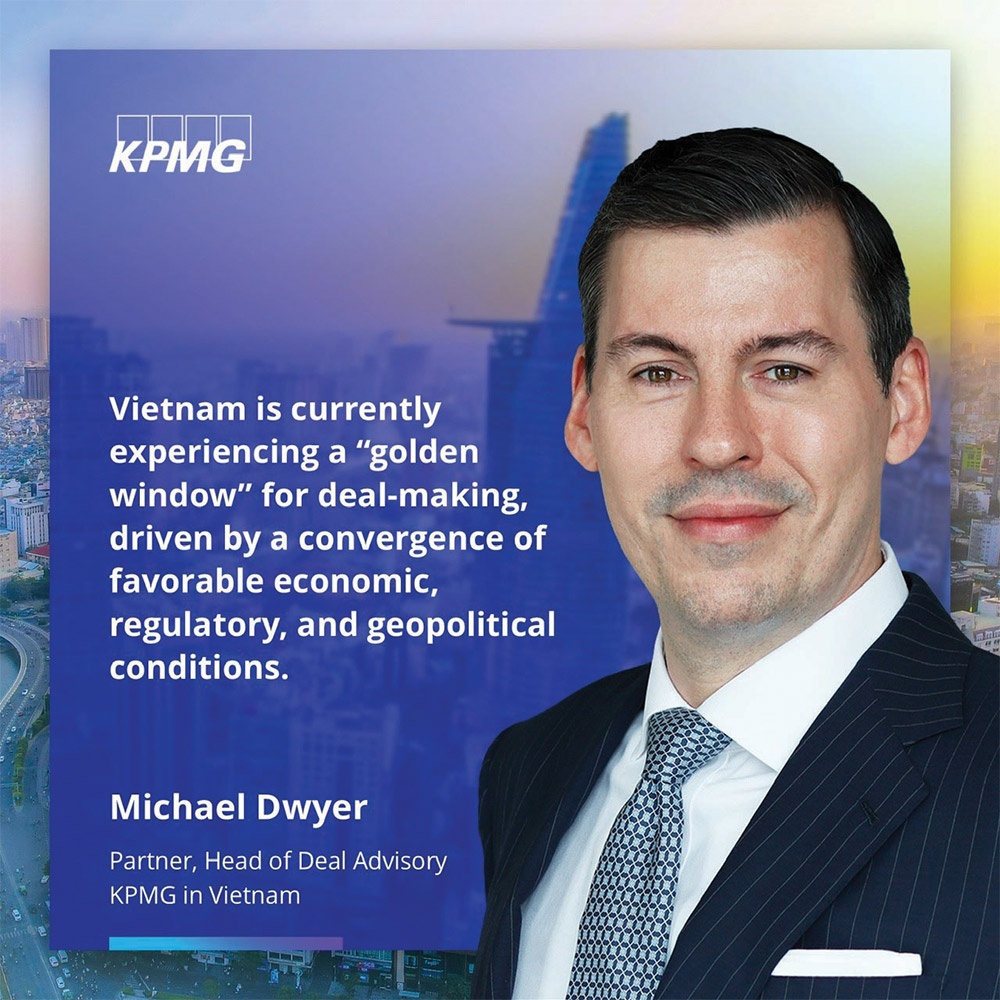INTERNATIONAL INVESTMENT
AND PORTAL
You’ve recently taken on the role of leading Deal Advisory at KPMG during a period when Vietnam is attracting a strong wave of international investment. What makes this moment a great one for deals in Vietnam?
 Michael Dwyer, partner and head of Deal Advisory at KPMG
Michael Dwyer, partner and head of Deal Advisory at KPMG
This moment in Vietnam is widely considered a “golden window” for deals due to a convergence of favourable economic, regulatory, and geopolitical factors that make the country especially attractive for investors and dealmakers in 2025 and onwards.
Specific factors include strong economic momentum, government reforms and incentives, as well as strategic global positioning, which shall all lead to a significant rebound in merger and acquisition activity. We anticipate deal activity via FDI to come from the following sectors: private equity (PE), financial services, and private credit. Additionally, large domestic corporations or conglomerates shall also be a key contributor to deal activity as a result of Government initiatives such as Resolution 68.
Having worked in major financial hubs such as New York, London, Hong Kong, and Singapore, what have you discovered that cannot simply be replicated from more developed markets?
In Vietnam, business success often hinges on cultural nuances that differ from developed markets. Trust and personal relationships frequently outweigh formal contracts, making rapport-building essential and time-intensive. The regulatory environment is less predictable, requiring local insight and adaptability rather than rigid adherence to rules.
While the workforce is young and motivated, replicating Western-style organisational structures demands investment in leadership development. Vietnam’s markets are highly localised, so strategies must be tailored to specific regions rather than applied uniformly.
In addition, the fast-paced yet unstructured business climate favours agility over process, meaning rigid systems from mature markets can hinder rather than help execution.
In cross-border transactions, international standards often collide with local legal frameworks, cultural nuances, or execution speed. How do you navigate these tensions to maintain global consistency while ensuring local flexibility?
Navigating the tension between international standards and local realities in cross-border transactions requires a dual mindset: global consistency with local adaptability.
The key is to establish a clear framework rooted in international best practices – such as compliance, governance, and risk management – while allowing for flexible execution that respects Vietnam’s legal nuances, cultural dynamics, and business tempo. This often means working closely with trusted local advisors, building strong relationships with stakeholders, and being willing to adjust timelines or structures to fit the local context.
Rather than imposing rigid systems, successful operators create hybrid models that uphold global integrity but are responsive to Vietnam’s unique environment. As an international and Asia-Pacific network, KPMG Vietnam can leverage methodologies and experts from member firms across the region in order to maintain quality and consistency, whilst collaborating closely with trusted advisors such as local legal experts in Vietnam.
In fast-growing economies, the success of an investment deal often hinges on three variables: data quality, transparency, and decision-making speed. What are the key obstructions and what improvements are needed to enhance investor confidence and market credibility?
Vietnam’s investment landscape faces several bottlenecks that impact deal success and investor confidence.
Data quality remains a challenge, with inconsistent and non-standardised reporting making due diligence difficult. Transparency is hindered by opaque legal frameworks and uneven enforcement of governance, especially across provinces and sectors like real estate and banking. Decision-making speed is slowed by fragmented administrative processes and overlapping jurisdictions.
To address these issues, Vietnam is working to improve corporate reporting through IFRS and adoption of environmental, social, and governance (ESG) considerations, strengthen legal enforcement, and enhance administrative efficiency via e-government tools. These reforms are already boosting investor sentiment, as seen in Vietnam’s FTSE Russell upgrade and rising confidence among overseas investors.
The asset management and PE industries are increasingly focused on value creation, with AI emerging as the most significant opportunity to drive this at both the fund and portfolio levels. According to KPMG’s recent global CEO survey, 71 per cent of CEOs now consider AI a top investment priority.
In 2025, KPMG conducted the world’s largest AI opportunity study, analysing over 17 million companies and revealing that current-generation AI tools offer an average earnings before interest, taxes, depreciation, and amortisation uplift of nearly 11 per cent.
However, adoption remains slow, largely due to organisational and people-related challenges rather than technological limitations. KPMG has developed a value capture approach that significantly accelerates AI implementation and value realisation compared to traditional change management methods.
Globally, nearly 30,000 KPMG professionals are dedicated to helping clients deploy AI and manage associated risks and financial strategies.
With increasing PE and credit inflows into Vietnam, which sectors are expected to become the most dynamic deal hotspots between 2025 and 2028?
Between now and 2028, Vietnam is expected to see vibrant deal activity in healthcare, logistics, technology, and green energy – driven by rising domestic demand, ESG priorities, and digital transformation. Long-aged PE assets are increasingly being deployed into scalable platforms and infrastructure plays, reflecting a shift towards sustainable, long-term value creation.
Vietnam’s drive for innovation, digitalisation, and green growth is further catalysing investment momentum across these sectors. As Vietnam continues to align with global standards and attract institutional capital, these industries are set to become the country’s most dynamic deal hotspots.



















